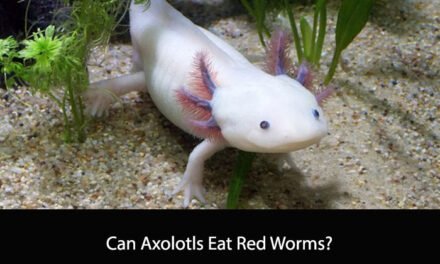Baby geese, also known as goslings, are adorable and often seen near ponds and lakes. Many people enjoy feeding them bread, but is this really a healthy option for these little birds? In this article, we will explore the question: Can baby geese eat bread?
There is a common misconception that feeding bread to ducks and geese is harmless and even helpful. However, this is not the case. While bread may fill their stomachs, it provides little to no nutritional value and can actually be harmful to their health. In fact, feeding ducks and geese bread regularly can lead to malnutrition, obesity, and even a condition called “angel wing” where the wings grow abnormally and cannot be used for flight.
So, what should we feed baby geese instead of bread? There are several options that are much healthier for them, such as cracked corn, oats, barley, and birdseed. These foods provide the necessary nutrients for their growth and development, and can be found at most pet stores or online. By feeding baby geese a healthy diet, we can help ensure their well-being and longevity.
Understanding Baby Geese Dietary Needs
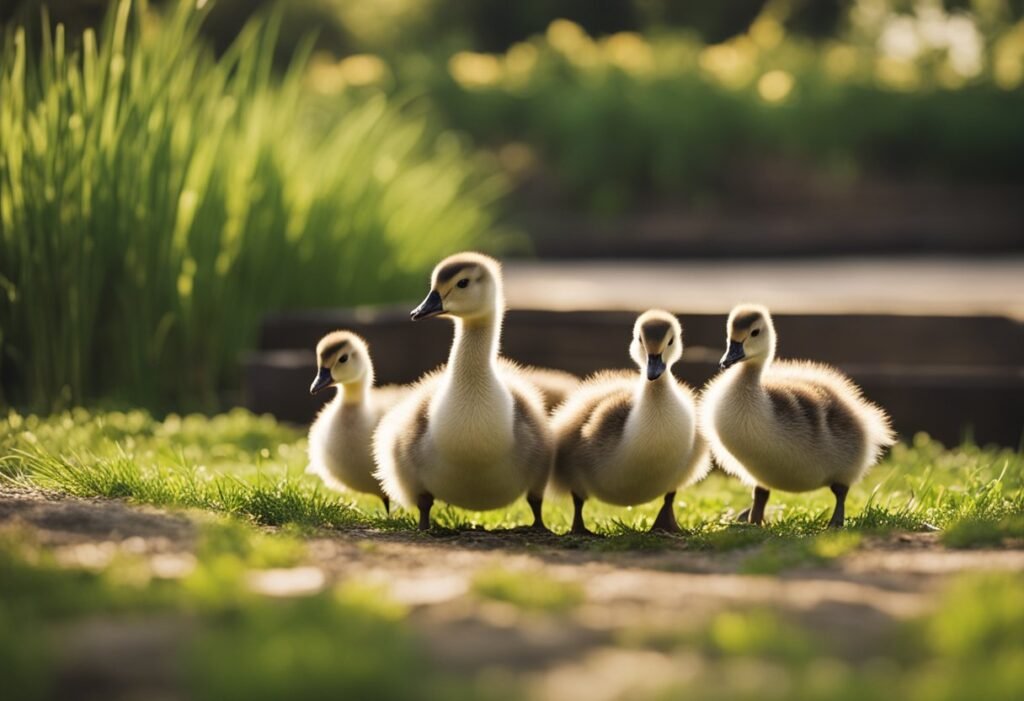
As caretakers of baby geese, it is important for us to understand their dietary needs. While bread may seem like a convenient and easy option, it is not the best choice for their health.
Baby geese require a balanced diet that includes a variety of nutrients to support their growth and development. Their diet should consist of a combination of protein, carbohydrates, vitamins, and minerals.
Feeding them a diet high in carbohydrates, such as bread, can lead to nutritional deficiencies and health problems. In addition, feeding them bread can cause them to become dependent on human food, which can lead to further health issues and disrupt their natural foraging behaviors.
Instead, we should provide them with a diet that mimics their natural diet in the wild. This can include a combination of grasses, grains, and insects. Commercially available waterfowl feed can also be a good option, as it is specifically formulated to meet their dietary needs.
In summary, while it may be tempting to feed baby geese bread, it is not the best choice for their health. Providing them with a balanced diet that includes a variety of nutrients will ensure their growth and development and promote their natural behaviors.
Harmful Effects of Bread on Baby Geese
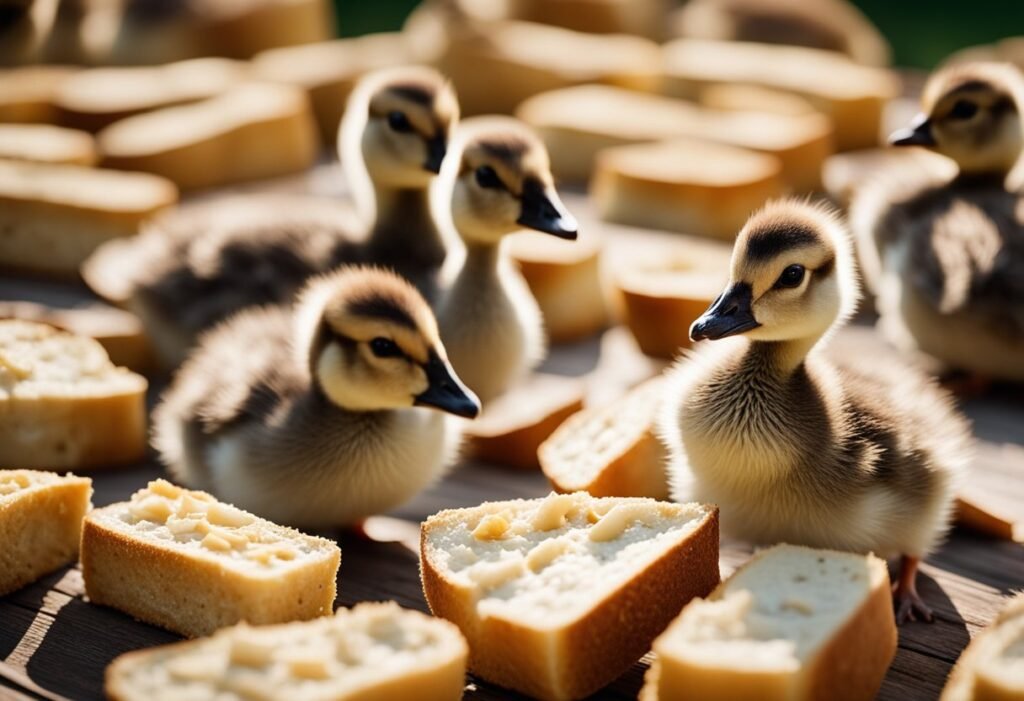
Malnutrition
Feeding bread to baby geese can lead to malnutrition as bread lacks the necessary nutrients required for their growth and development. Bread is high in carbohydrates and low in protein, which is essential for the growth of muscles, feathers, and bones. Overfeeding bread can lead to stunted growth and weakened immune systems, making baby geese more susceptible to diseases.
Digestive Problems
Bread can also cause digestive problems for baby geese. Their digestive systems are not designed to digest bread, which can lead to blockages in their digestive tracts. This can cause discomfort, pain, and even death in severe cases. Moreover, feeding bread to baby geese can alter their gut microbiome, which can lead to a range of digestive problems.
Dependence on Human Food
Feeding bread to baby geese can also create a dependence on human food. Baby geese that are fed bread regularly may become accustomed to human food and stop foraging for their natural diet. This can lead to a decrease in their natural foraging behavior, which is essential for their survival in the wild.
In conclusion, feeding bread to baby geese can have harmful effects on their health and well-being. As responsible caretakers, it is important to provide them with a balanced diet that meets their nutritional needs and supports their natural behaviors.
Healthy Food Alternatives for Baby Geese
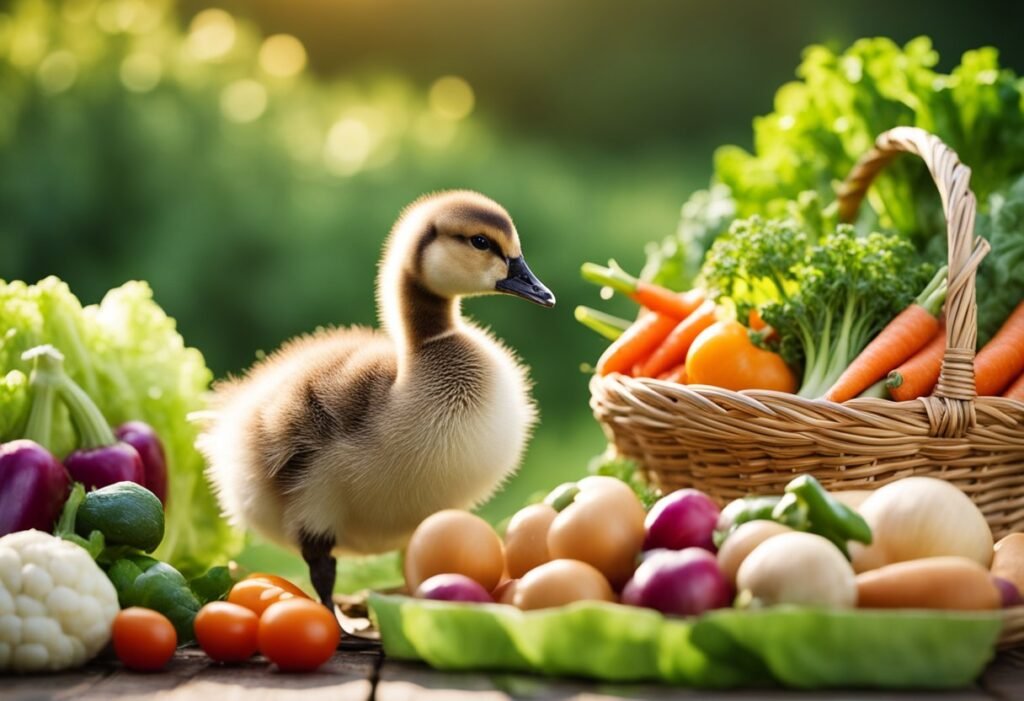
Natural Diet
As with any animal, it’s best to provide baby geese with a natural diet that mimics what they would eat in the wild. In their natural habitat, baby geese would eat a variety of plants, insects, and small aquatic animals. Therefore, it’s recommended to feed baby geese a diet that consists of grass, clover, dandelions, and other greens.
Supplemental Feeding
While a natural diet is best, baby geese may need some supplemental feeding to ensure they are getting all the nutrients they need. Some good options for supplemental feeding include:
- Duckweed: This aquatic plant is high in protein and is a favorite food of many waterfowl species.
- Cracked corn: This is a good source of carbohydrates and can be fed in small amounts as a treat.
- Mealworms: These are high in protein and can be fed as a treat.
It’s important to note that bread should not be fed to baby geese as it lacks the essential nutrients they need and can cause health problems. Additionally, feeding bread to waterfowl can lead to overcrowding and the spread of diseases.
In summary, providing baby geese with a natural diet of greens and supplementing with high-protein foods like duckweed and mealworms can help ensure they grow up healthy and strong. Avoid feeding them bread and other processed foods that lack essential nutrients.
Feeding Guidelines for Baby Geese
When it comes to feeding baby geese, it is important to provide them with a balanced diet that meets their nutritional needs. Here are some guidelines to follow:
Appropriate Quantity
It is important to provide baby geese with the appropriate quantity of food to ensure they are getting the nutrients they need without overfeeding them. Overfeeding can lead to health problems such as obesity and malnutrition.
As a general rule, baby geese should be fed a diet that is 20% protein and 80% carbohydrates. This can be achieved by providing them with a mix of grains, seeds, and greens. A good starting point is to provide them with a handful of food per bird, three times a day.
Feeding Frequency
Baby geese should be fed frequently throughout the day to ensure they are getting enough food and to prevent overfeeding. As mentioned, a good starting point is to provide them with a handful of food three times a day. However, this can be adjusted based on the age and size of the birds.
It is important to monitor the birds’ behavior and adjust the feeding schedule accordingly. If the birds are constantly begging for food, it may be necessary to increase the feeding frequency. On the other hand, if the birds are not finishing their food, it may be necessary to decrease the feeding frequency.
In conclusion, feeding baby geese a balanced diet that meets their nutritional needs is essential for their health and well-being. By following these guidelines for appropriate quantity and feeding frequency, you can ensure that your baby geese are getting the nutrients they need to thrive.
Impact on Ecosystem
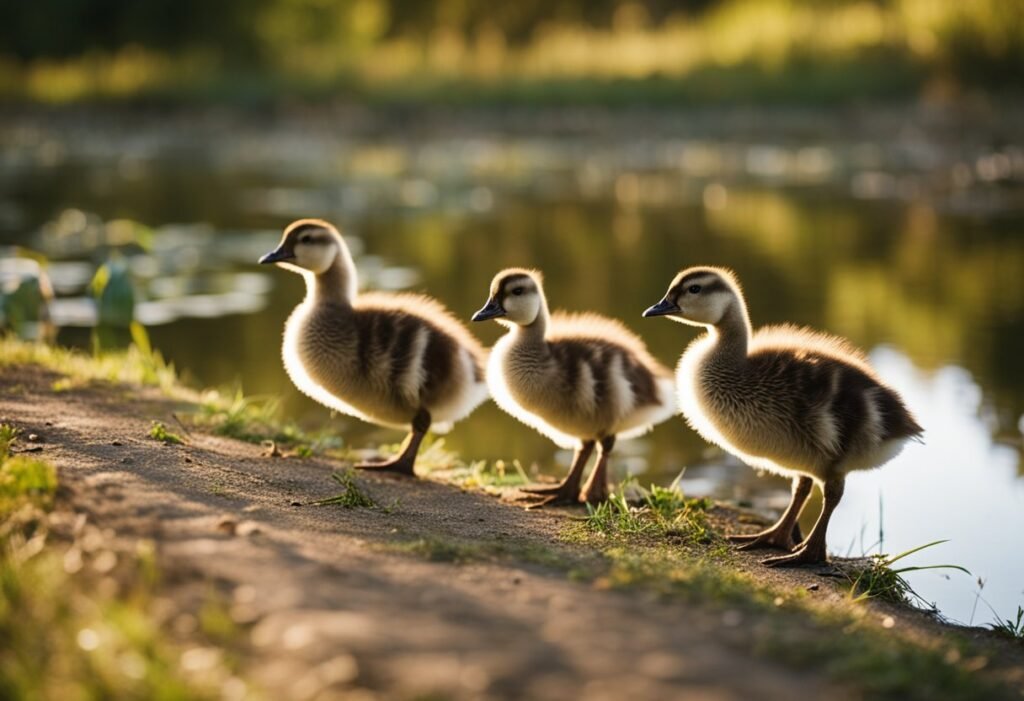
Disruption of Natural Behavior
Feeding bread to baby geese can have a negative impact on their natural behavior. When geese are fed by humans, they become accustomed to being fed and may lose their natural instinct to forage for food. This can lead to a dependence on humans for food, which can be detrimental to their survival in the wild.
In addition, feeding geese in public areas can lead to overcrowding and competition for resources. This can cause aggression among geese and can also lead to the spread of disease.
Effect on Water Quality
Feeding bread to baby geese can also have a negative impact on water quality. Bread is not a natural food source for geese, and it can cause digestive problems and lead to an increase in fecal matter in the water. This can lead to an increase in harmful bacteria and algae, which can have a negative impact on the overall health of the ecosystem.
Furthermore, when bread is left uneaten, it can attract other animals such as rats and seagulls. This can lead to an increase in the population of these animals, which can have a negative impact on the local ecosystem.
In conclusion, feeding bread to baby geese may seem like a harmless activity, but it can have a negative impact on the natural behavior of geese and the overall health of the ecosystem. It is important to remember that geese are wild animals and should be left to forage for their own food in their natural habitat.
Frequently Asked Questions
What can geese eat besides bread?
Geese can eat a variety of foods besides bread. They are natural grazers and prefer to eat grass, plants, and grains. Other suitable foods include cracked corn, oats, wheat, and barley. You can also offer them fresh fruits and vegetables as treats.
Is it harmful to feed geese bread?
Feeding geese bread is not recommended as it lacks essential nutrients and can cause health problems. Bread can also lead to overfeeding and obesity in geese, which can be harmful to their health. It is best to avoid feeding them bread altogether.
What should I feed baby geese?
Baby geese, also known as goslings, require a balanced diet to grow healthy and strong. A suitable diet for goslings includes a combination of high-quality starter feed, fresh water, and grit. You can also offer them small amounts of fresh fruits and vegetables as treats.
What fruits and vegetables can geese eat?
Geese can eat a variety of fruits and vegetables, including lettuce, kale, spinach, carrots, apples, and berries. However, it is important to offer them these foods in moderation and as treats only. Too much of these foods can cause digestive problems in geese.
Can geese eat popcorn?
Popcorn is not a suitable food for geese as it lacks essential nutrients and can be harmful to their health. It is best to avoid feeding them popcorn altogether.
What is a healthy diet for geese?
A healthy diet for geese includes a combination of grass, plants, grains, and high-quality feed. Fresh water and grit should also be provided at all times. Treats such as fresh fruits and vegetables can be offered in moderation. It is important to avoid feeding them bread and other unhealthy foods.




